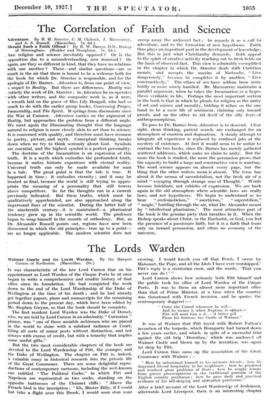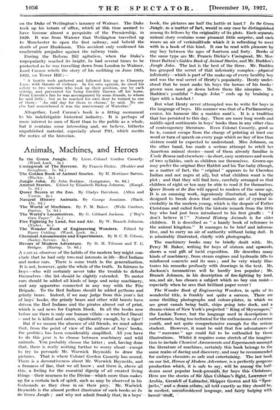The Lords Warden
Valmer Castle and its Lords Warden. By the Marquis Curzon of Kedleston. (Macmillan. 288.) was characteristic of the late Lord Curzon that on his Appointment as Lord Warden of the Cinque Ports he at once began to write a comprehensive and erudite history of that office since its foundation. He had completed the work down to the end of the Lord Wardenship of the Duke of Wellington at the time of his death ; and he had already got together papers, plans and manuscripts for the remaining period down to the present day, which have been edited by Mr. Stephen Gwynn, so that the book should be complete.
The first resident Lord Warden was the Duke of Dorset, who, we are told by Lord Curzon in an admirably" Curzonian " phrase, was "one of those amiable noblemen who are placed in the world to shine with a subdued radiance at Court, Ailing all sorts of minor posts without distinction, and not always with excess of credit, but with a tenacity that implies some useful gifts."
But the two most considerable chapters of the book are devoted to the Lord Wardenship of Pitt, the younger, and the Duke of Wellington. The chapter on Pitt is, indeed, a valuable essay in historical research into the private life of the Great Commoner. There are some delightful repro- ductions of contemporary cartoons, including the well-known One entitled "The Political Cocks," in which Pitt and Napoleon are repiesented as two cocks, standing on the opposite buttresses of the Channel cliffs : "Above the French bird is the inscription : 'Eh, Master Billy, if I could but take a flight over this Brook. I would soon ston your crowing. I would knock you off that Perch, I swear by Mahornet, the Pope, and all the Idols I have ever worshipped.' Pitt's reply is a stentorian crow, and the words, 'That you
never can do 1 ' " Lord Curzon shows how seriously both Pitt himself and the public took his office of Lord Warden of the Cinque Ports. It was to them an almost more important office than that of Prime Minister, at a time when the country was threatened with French invasion, and he quotes the contemporary doggerel :—
" Come the Consul whenever he will— And he means it when Neptune is calmer—
Pitt will send him a bitter 'pill From his fortress, the Castle of Wahner."
It was at Weimer that Pitt toyed with Robert Fulton's invention of the torpedo, which Bonaparte had turned down a few years earlier, and which, in spite of a successful trial against the old brig 'Dorothea,' which was anchored off Weimer Castle and 'blown up by the invention, was again
let drop by Pitt.
Lord Curzon thus sums up the association of the Great Commoner with Weimer :—
" Here he unbosomed himself to his intimate friends ; here he dispensed liberal hospitality to his neighbours ; here he pondered and resolved great problems of State' here he sought leisure from graver preoccupations in the traditional pursuits of the English country gentleman ; here he gave daily and practical evidence of his self•denying and unwearied patriotism," After a brief account of the Lord Wardens1V of Jenkinson, afterwards Lord Liverpool, there is an interesting chapter
on the Duke of Wellington's tenancy of Walmer. . The Duke took up his tenure of office, Which at this time seethed to have become almost a perquisite of the Premiership, in 1829. It was from Wahner that Wellington travelled up to Manchester to open the first railway, and beheld the death of poor Iluskisson. This accident only confirmed his unalterable prejudice against the railway train.
During the -Reform Bill agitation, when the Duke's unpopularity reached its height, he had several times to be protected as he was travelling down from London to Walmer. Lord Curzon retells the story of his mobbing on June 18th, 1832, on Tower Hill :—
" A hostile mob gathered and followed him up to Chancery Lane, with threats of violence. In his own opinion, he owed his safety to two veterans who took up their position, one by each stirrup, and prevented his being forcibly thrown off his horse. From Lincoln's Inn he was accompanied by some friends, to whom he said little ; but as he reached his own door he turned to one of them : An odd day for them to choose,' he said. No one else had remembered it was the anniversary of Waterloo."
Altogether, Lord Curzon's book is a fitting monument to his indefatigable historical industry. It is perhaps of more interest to men of Kent than to the public as a whole, but it contains some interesting and, we believe, hitherto unpublished material, especially about Pitt, which merits the notice of the historian.











































 Previous page
Previous page